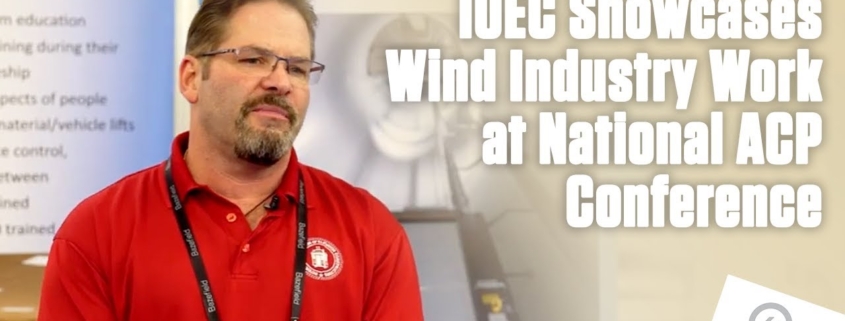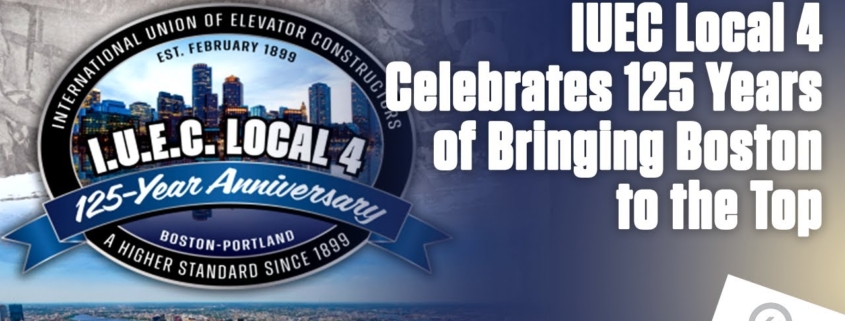Last spring, representatives from the International Union of Elevator Constructors attended the American Clean Power (ACP)’s Operations, Maintenance and Safety Conference in San Diego, California.
“We’ve been coming to this conference for about 13 years. Today they’re gathering people from all over the world,” said Carisa Barrett, National Coordinator for the Elevator Industry Work Preservation Fund (EIWPF).
According to ACP’s 2024 recap, more than 1,500 attendees and 140 exhibitors gathered at the conference to talk about retention strategies, recruitment techniques and training best practices in an effort to make the wind industry stronger and safer.[1]
Most people from outside the wind industry don’t realize that there are elevators inside both land-based and offshore wind turbine towers. Their purpose? To transport the technicians who maintain and repair the nacelle units that harness the energy generated by the blades and convert it into electricity. Nacelle technicians carry heavy bags of tools and diagnostic equipment up with them to the top of the towers, which typically reach heights of 300-500 feet.
While wind technicians are trained for and skilled at their work on the nacelle units they service, to work on the elevator units within the wind towers. That’s where IUEC elevator constructors come in. Elevator constructors from IUEC-affiliated companies work on wind turbine elevator systems across the United States, including those at the Block Island Wind Farm in Rhode Island – the country’s first commercial offshore wind farm.
Their work includes:
- Installation
- Modernization
- Retrofitting
- Maintenance
- Repair
- Jurisdiction compliance inspection
“If it moves horizontally or vertically, we do it. We move people and equipment, including cars and heavy materials. And wind turbines, especially since they’re getting bigger now, they’re starting to put elevators in all of them. And our folks are the ones that are properly skilled and trained to work on the different types of equipment that are used for elevators in the wind turbines,” said Vance Ayres, National Organizer and Director of Wind Turbine Affairs for the International Union of Elevator Constructors.
Elevator technicians in the IUEC receive the most comprehensive, safety-focused foundational training in the elevator industry through a four-plus year USDOL-Registered Apprenticeship administered by the National Elevator Industry Educational Program (NEIEP). Apprentices must complete 8 semesters of college-level classroom training with hands-on practical labs, log 8,000 hours of on-the-job learning under the supervision of a journeyman mechanic, and pass a capstone examination in order to graduate with mechanic status. During their time in the apprenticeship program, IUEC members also earn trade certifications such as OSHA 10-hour for General Industry, American Heart Association Heartsaver First Aid CPR AED, Competent Person training for Framed and Suspended Scaffolding (through the SAIA), and industry-specific crane rigging and signaling.
“We’re the best in the world at what we do, the most highly skilled trades folks, the safest group, efficient, on time, because of our skilled training. We’ve expanded our educational (offerings) more toward the wind turbine industry itself, both onshore and offshore,” Ayres continued.
Through a collaborative learning program with Survival Systems USA in Groton, CT, IUEC elevator constructors from all over the United States have completed Global Wind Organization (GWO) Basic Training. Elevator technicians/constructors who work on onshore and offshore wind turbine elevators can become certified in the following areas:
- GWO BST-1005 Basic Safety Training
- GWO BST-WAH-1002 Work at Height
- GWO BST-MH-102 Manual Handling
- GWO BST-FA-2002 Medic First Aid + Trauma
- GWO BST-FA-101 Fire Awareness
- GWO-SS GWO Sea Survival
- GWO-EFA Enhanced First Aid
- GWO-ART Advanced Rescue Training
When asked why IUEC elevator mechanics are the best choice to perform work on wind turbine elevators, Nick Moore, IUEC Local 8 Organizer, explains it this way: “We are the ones that could safely perform this work. We are the ones that could adapt to this work the easiest.”
“That’s what we do. We do elevators. We know every aspect of elevators inside and out. We have an apprenticeship program that trains us from A to Z,” Barrett continued.
Stop by the IUEC booth to speak with Vance Ayres, Carisa Barrett, and other elevator industry representatives at these upcoming conferences:
- ACP O&M 2025, March 3-5, Nashville TN
- IPF Offshore 2025, April 28-May 1, Virginia Beach VA
- ACP Cleanpower 2025, May 19-22, Phoenix AZ
- ACP Offshore 2025, October 6-8, Boston MA
To learn more about the work IUEC elevator constructors are doing in the wind industry and why their experience, education, and training makes them the best choice to work on this specialized equipment, visit https://www.elevatorinfo.org/wind-turbine-elevators/


